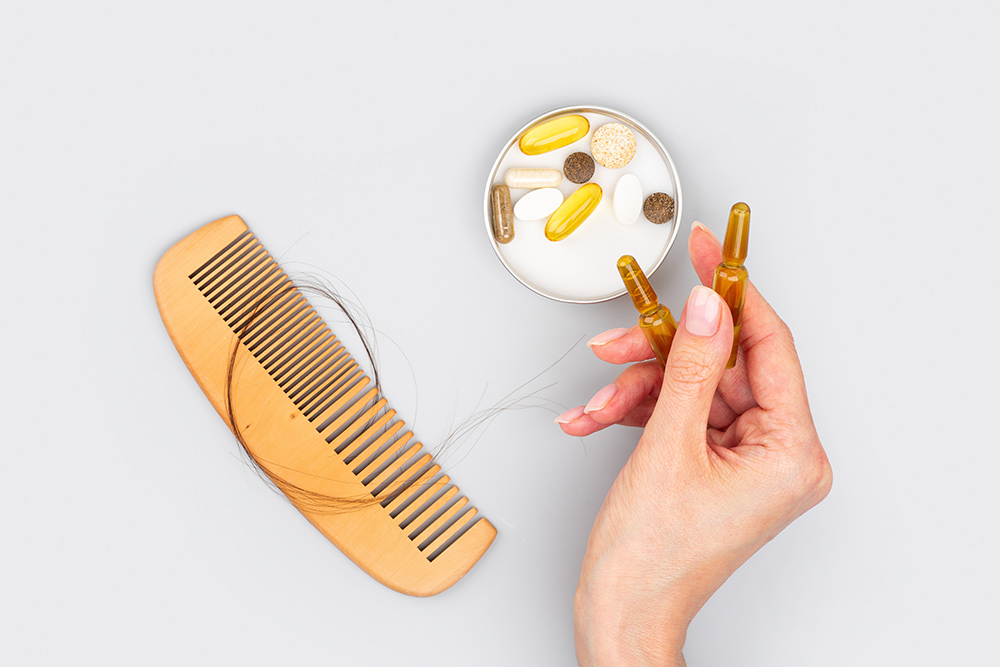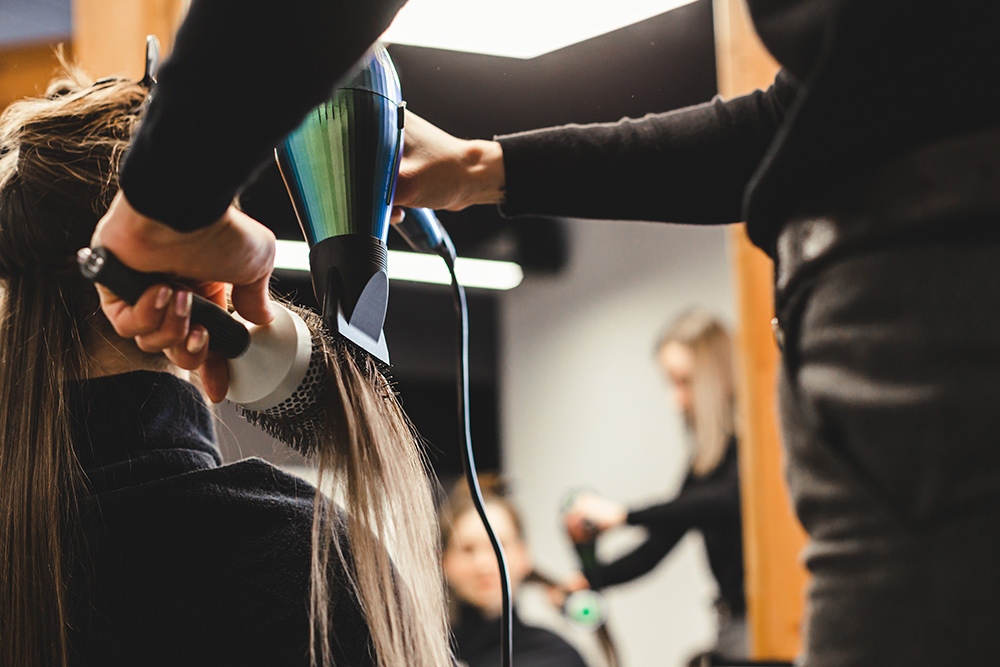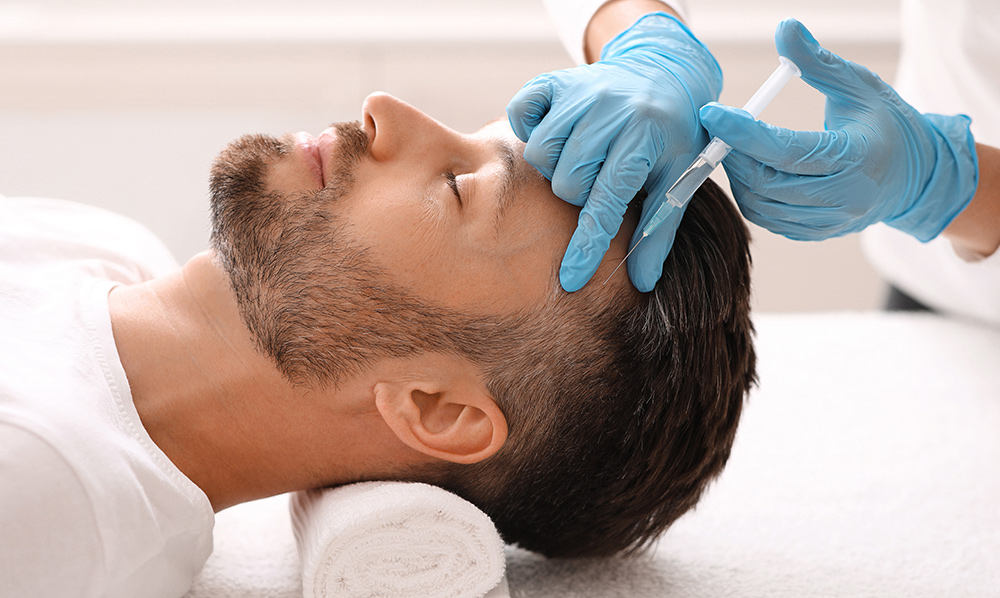
Maintain a Healthy Diet
Your diet plays a critical role in hair growth and overall hair health. A well-balanced diet rich in vitamins and minerals can help slow hair loss and stimulate hair growth. Consider including the following nutrients:- Protein: Hair follicles are made mostly of protein, so a diet rich in protein can help strengthen hair.
- Iron and Zinc: These minerals promote hair growth and prevent hair shedding.
- Omega-3 Fatty Acids: These healthy fats help maintain a healthy scalp, which is essential for hair growth.
- Vitamins A, C, and E: These vitamins protect your hair from damage and keep it healthy.
Reduce Stress
Excessive stress may trigger a condition called telogen effluvium, where hair suddenly shifts from the growth phase to the shedding phase, leading to significant hair loss. This is because stress hormones can interfere with the natural hair growth cycle, causing more hair to fall out than usual. By addressing stress, you can help restore your hair’s growth cycle and prevent further hair loss. To combat stress, consider integrating stress-relieving techniques into your daily routine:- Yoga: Yoga not only helps with physical flexibility but also relaxes the mind, reducing the production of stress hormones like cortisol.
- Meditation: Practising mindfulness and deep breathing techniques can calm the nervous system and decrease stress.
- Exercise: Physical activity increases blood circulation, including to the scalp, which can stimulate hair follicles while helping to reduce anxiety.

Avoid Excessive Heat and Chemical Treatments
Overuse of heat styling tools and chemical treatments weakens the hair shaft, causing hair breakage, dryness, and eventually hair loss. Tools such as hair dryers, flat irons, and curling wands can strip the hair of its natural moisture, leaving it brittle and more prone to breakage. Similarly, chemical treatments like hair dyes, bleaching, perming, and straightening can damage hair by breaking down the hair’s natural proteins. To protect your hair and reduce the risk of further hair loss, consider the following tips:- Minimise Heat Styling: Try to limit the use of heat tools to once or twice a week. When you do use them, apply a heat protectant spray to shield your hair from damage.
- Use Gentle Hair Products: Opt for natural, sulphate-free shampoos and conditioners such as Stim hair care that won’t strip your hair of its natural oils.
- Air-Dry Hair When Possible: Instead of blow-drying your hair after every wash, allow your hair to air-dry. This will help preserve your hair’s natural moisture, preventing dryness and breakage.
Regular Scalp Care
The health of your scalp plays a crucial role in hair growth and preventing hair loss. A dry, irritated, or clogged scalp can impede hair follicles’ ability to grow hair, leading to thinning or slow hair growth. Incorporating regular scalp care into your routine can promote a healthier environment for hair to grow. Consider the following for effective scalp care:- Scalp Massage: Massaging your scalp regularly may increase blood circulation to the hair follicles, encouraging hair growth. You can use your fingers or a special scalp massager for this.
- Essential Oils: Some studies suggest oils like rosemary oil and peppermint oil may promote hair growth. However, consult with a healthcare professional before using these.
- Exfoliate Your Scalp: Just like your skin, your scalp can benefit from gentle exfoliation. Use a scalp scrub or a brush to remove dead skin cells, oil, and product buildup, keeping hair follicles clear and healthy.
Watch for Signs of Pattern Baldness
Pattern baldness is a common cause of hair loss in both men and women. In men, it often manifests as a receding hairline or thinning at the crown, while female pattern hair loss generally causes diffuse thinning across the scalp. This type of hair loss is primarily caused by genetics and hormonal changes. Early intervention is key when dealing with pattern baldness. Here’s how to spot the signs:- Receding Hairline: For men, a receding hairline that moves back from the forehead or temples is an early indicator of male pattern baldness.
- Thinning Hair: For women, hair thinning that is especially noticeable when parting the hair can signal female pattern baldness.
- Patchy Hair Loss: In both men and women, patchy hair loss or areas where the hair is noticeably thinner than others can indicate the onset of baldness.

Professional Hair Loss Treatments
If natural methods are not enough, there are a variety of professional treatments available to help combat significant hair loss or pattern baldness. Here are some of the most effective options:- FUE Hair Transplant: A procedure where hair follicles are moved from areas with dense hair growth to areas experiencing thinning or baldness. This procedure aims to provide long-term results and may be considered for those with advanced hair loss.
- Scalp Micropigmentation: This cosmetic treatment uses pigment to create the appearance of thicker hair by mimicking hair follicles on the scalp. It’s a non-invasive option for those who want the look of a fuller head of hair without surgery.
- Growth Factor Hair Loss Treatment: This treatment involves using growth factors derived from platelet-rich plasma (PRP) with the aim of stimulating hair follicles and encouraging hair regrowth.
- Hair Loss Medication: Prescription medications may help slow down hair loss and, in some cases, promote new hair growth. Prescription medications may be considered to address hair loss. Your healthcare provider can discuss potential benefits and risks.
Why Choose ICCM for Your Hair Loss Treatment?
Choosing the right clinic for your hair loss treatment is essential for achieving the best results. Here’s why ICCM stands out:- Experienced Specialists: Our team of hair loss specialists has extensive experience in advanced hair restoration procedures.
- Comprehensive Care: From consultation to post-treatment care, we offer personalised and attentive support to ensure optimal outcomes.
- State-of-the-Art Facilities: ICCM is equipped with cutting-edge technology, ensuring safe and effective treatments.
- Tailored Treatment Plans: We understand that every patient’s needs are unique, and we create custom treatment plans to meet your specific hair restoration goals.
- Patient-Centred Approach: Your satisfaction is our priority. We take the time to address all your questions and concerns, ensuring you feel comfortable throughout your journey.
